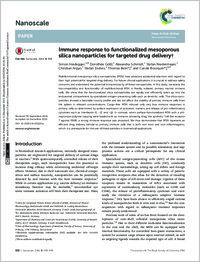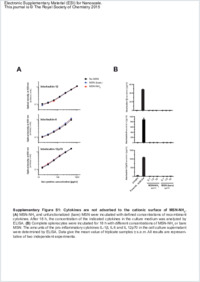Immune response to functionalized mesoporous silica nanoparticles for targeted drug delivery
- Heidegger, Simon Center for Integrated Protein Science Munich (CIPSM), Division of Clinical Pharmacology, Medizinische Klinik und Poliklinik IV, Ludwig-Maximilians-Universität München, Germany - III. Medizinische Klinik, Klinikum Rechts der Isar, Technische Universität München, Germany
- Gößl, Dorothée Department of Chemistry and Center for NanoScience (CeNS), University of Munich, Germany
- Schmidt, Alexandra Department of Chemistry and Center for NanoScience (CeNS), University of Munich, Germany
- Niedermayer, Stefan Department of Chemistry and Center for NanoScience (CeNS), University of Munich, Germany
- Argyo, Christian Department of Chemistry and Center for NanoScience (CeNS), University of Munich, Germany
- Endres, Stefan Center for Integrated Protein Science Munich (CIPSM), Division of Clinical Pharmacology, Medizinische Klinik und Poliklinik IV, Ludwig-Maximilians-Universität München, Germany
- Bein, Thomas Department of Chemistry and Center for NanoScience (CeNS), University of Munich, Germany
- Bourquin, Carole Center for Integrated Protein Science Munich (CIPSM), Division of Clinical Pharmacology, Medizinische Klinik und Poliklinik IV, Ludwig-Maximilians-Universität München, Germany - Chair of Pharmacology, Department of Medicine, Faculty of Science, University of Fribourg, Switzerland
-
23.12.2015
Published in:
- Nanoscale. - 2015, vol. 8, no. 2, p. 938–948
English
Multifunctional mesoporous silica nanoparticles (MSN) have attracted substantial attention with regard to their high potential for targeted drug delivery. For future clinical applications it is crucial to address safety concerns and understand the potential immunotoxicity of these nanoparticles. In this study, we assess the biocompatibility and functionality of multifunctional MSN in freshly isolated, primary murine immune cells. We show that the functionalized silica nanoparticles are rapidly and efficiently taken up into the endosomal compartment by specialized antigen-presenting cells such as dendritic cells. The silica nanoparticles showed a favorable toxicity profile and did not affect the viability of primary immune cells from the spleen in relevant concentrations. Cargo-free MSN induced only very low immune responses in primary cells as determined by surface expression of activation markers and release of pro-inflammatory cytokines such as Interleukin-6, -12 and -1β. In contrast, when surface-functionalized MSN with a pH-responsive polymer capping were loaded with an immune-activating drug, the synthetic Toll-like receptor 7 agonist R848, a strong immune response was provoked. We thus demonstrate that MSN represent an efficient drug delivery vehicle to primary immune cells that is both non-toxic and non-inflammagenic, which is a prerequisite for the use of these particles in biomedical applications.
- Faculty
- Faculté des sciences et de médecine
- Department
- Département de Médecine
- Language
-
- English
- Classification
- Biological sciences
- License
-
License undefined
- Identifiers
-
- RERO DOC 258389
- DOI 10.1039/C5NR06122A
- Persistent URL
- https://folia.unifr.ch/unifr/documents/304816
Other files
Statistics
Document views: 92
File downloads:
- pdf: 214
- Supplementary material: 114

